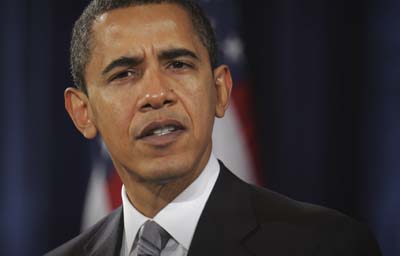By DEVLIN BARRETT and EILEEN SULLIVAN
WASHINGTON
The Obama administration plans to send more agents and equipment to the southwestern border to fight Mexican drug cartels and keep violence from spilling over into the United States.
Speaking at the White House Tuesday, Homeland Security Secretary Janet Napolitano said officials were still considering whether to deploy the National Guard to the border. She plans to meet with the governor of Texas to discuss the matter.
Deputy Attorney General David Ogden pledged “to destroy these criminal organizations” through a united effort on both sides of the border.
Secretary of State Hillary Rodham Clinton will travel to Mexico Wednesday for the start of several weeks of high-level meetings between the two countries on the drug violence issue.
Many of the moves announced Tuesday are a continuation or expansion of programs that already existed under the Bush administration.
Violent turf battles among the cartels have wracked Mexico in recent years, and led to a spate of kidnappings and home invasions in some U.S. cities.
Authorities said they will increase the number of immigrations and customs agents, drug agents and anti-gun trafficking agents operating along the border.
Prosecutors say they will make a greater effort to go after those smuggling guns and drug profits from the U.S. into Mexico.
Officials said President Barack Obama is particularly concerned about killings in Ciudad Juarez and Tijuana, and wants to prevent such violence from spilling over into the United States.
Among the moves the government is making:
-Doubling the border enforcement security teams that combine local, state, and federal officers.
-Adding 16 new Drug Enforcement Administration positions in the southwest region. DEA currently has more than 1,000 agents working in the southwest border region.
-Sending 100 more people form the Bureau of Alcohol, Tobacco, Firearms, and Explosives to the border in the next 45 days. A recent bill passed by Congress already provided money for the ATF to hire 37 new agents and support staff in the region to fight gun trafficking.
– Boosting the FBI’s intelligence and analysis work on Mexican drug cartel crime.
The administration is also highlighting $700 million that Congress has already approved to support Mexico’s efforts to fight the cartels.
Yet the plan so far falls short of Texas Gov. Rick Perry’s request last month that 1,000 troops be sent to bolster border security in his state.
During a visit to El Paso last month, Perry said he had asked Napolitano for aviation assets and “1,000 more troops that we can commit to different parts of the border.”
Asked then it he wanted the military, Perry said, “I really don’t care. As long as they are boots on the ground that are properly trained to deal with the border region, I don’t care whether they are military troops, or National Guard troops or whether they are customs agents.”
Last week, a Perry spokeswoman said that federal border protection had been underfunded for some time and that the 1,000 extra troops Perry requested would fill in gaps that state and local agencies have been covering.
While Mexico has insisted the U.S. take more responsibility in the drug fight, officials south of the border have also bristled at the increasing “militarization” of the border.
Mexico officials are likely to welcome the stepped up efforts north of the border, but they have argued that much of the extra border security added recently has made illegal immigration more dangerous and done little to nothing to crackdown on the illegal weapons trade.
Contributing to this report were Associated Press writer Christopher Sherman in McAllen, Texas, and Traci Carl in Mexico City.









